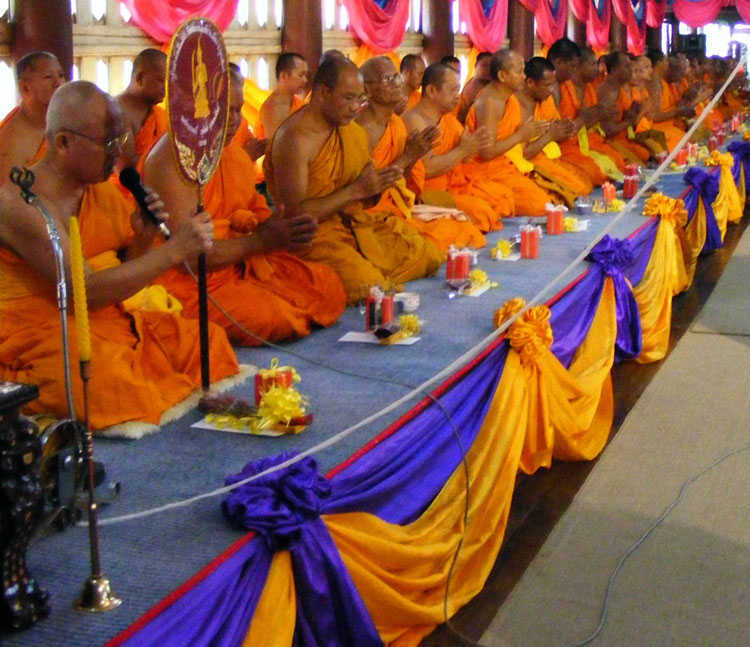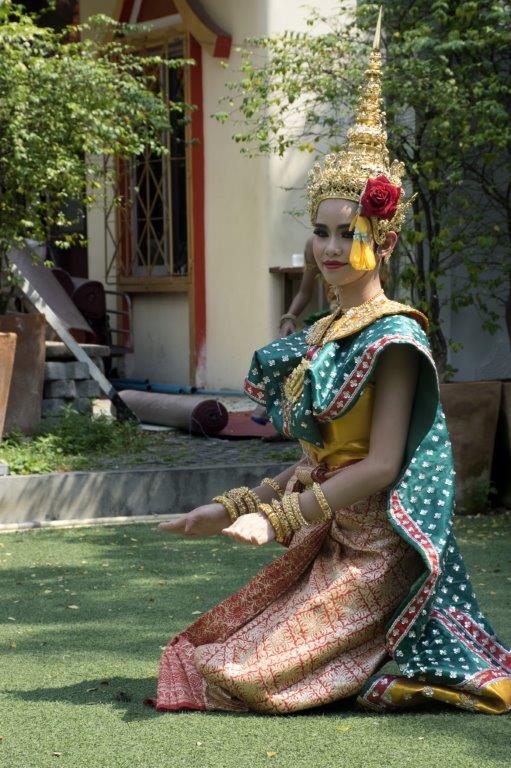Thai Culture and Code of Conduct
Thai Ways
Some common aspects of thai culture you should know.
- The common Thai greeting is the Wai, a prayer-like gesture using both hands. When Thai people wai you, you should wai back. When Thais and foreigners do business, it is common to shake hands.
Thai's are flexible in nature and most times understand, that foreigners can not know their code of behavior. Mostly, they are too polite to complain about anything you do out of ignorance. There are however, a few basic rules that you should observe.

- Thai people are very fond of and loyal to their king and queen and the whole royal family. Never criticize any member of the Royal Family or the institution itself. It's probably better not to bring them up in conversation at all.
The late King Bhumibol Adulyadej indeed was a well respected and remarkable man who has earned the adulation over the past 60 years of his reign. At any time, showing any disrespect towards the royal family is likely to evoke a rare outburst or disapproval from the locals. You could even get arrested for it!
- The religion should be respected as well. Temples, Buddha statues or monks are to be revered. Buddhist and Chinese shrines are open to foreigners but you should dress appropriately when visiting.
- Shorts and sleeveless shirts are discouraged. A non-muslim can enter a mosque, except during prayer time.
- Hilltop houses have special spirit rooms, which are closed to outsiders: entering them will violate their sanctity.
- Monks and Buddhist ceremonies can be photographed.

- Thais regard the feet of lower stature so do not point them at others or step over those seated or lying.
Feet are used for walking on and occupy the lowest part of the body (anatomically and metaphorically speaking). They get dirty in rice fields and on floors and should be tucked away out of sight, never pointed at anyone or used to point.
Of course, along come us bumbling ‘size 45’ farangs, insisting on wearing footwear everywhere.
Thailand is very much a ‘shoeless’ place and the culture of footwear here is quite different. For one, shoes are never worn indoors, it’s nice and tropically warm and far more comfortable to go shoeless within the spotless indoor environment. This of course means you’ll be removing your footwear a lot; every time you enter a temple, tourist attraction or home, so leave those 20 holed Doc Martens at home and pack your flip flops instead.
Just watch the locals, they’ve got it sorted, they ride motorbikes, go hiking, show up at work and even enter construction sites in their flimsy sandals. It works!
- Remove your shoes before entering a Thai temple or house.

- Avoid touching people on the head, It is considered very rude.
- Bigger is Better-Thai society has a complex and overwhelming hierarchy of status, and every Thai’s elevation up the ladder of respect is central to their motivation and very being. Age, money, fame or respect through the monkhood or teaching profession count for much in the status ranks.
- Expect the unexpected-Foreigners living here often find it unfathomable why certain habits thrive (such as ignoring safety rules on the road), or why their hosts carry out activities in the most bewildering way.
Your own judgement about whether it’s good or bad is irrelevant and by standing out from the rest and going against the flow, even to make a point about doing the ‘correct’ thing’, isn’t terribly popular or admired.
It’s polite to mind your own business
Thai Beliefs
Even though the country has modernised and become a lot more prosperous over the past three decades, Thais at heart are still very traditional and bound by modest behavioural habits. They also have a profoundly superstitious approach to life, based on Buddhist and spiritual fortune.
There is karmic cycle to everything Thailand, according to the popular traditional school of thought, and appeasing the spirits through merit making is paramount if you are to avoid misfortune. This has a overwhelming effect on the daily routine of all Thais as they go about their business.

Don’t be alarmed if your taxi driver takes both hands off the wheel in heavy traffic while doing 100kph to offer a quick wai to a passing Buddha statue. Expect to be held up while merit making takes place or to be shown the long way round to avoid consecrated ground.
Be prepared for all sorts of odd shaped construction to accommodate the feng shui practices, and get used to all sorts of changes to schedules to meet the most auspicious timing on the calendar.
Keeping in the Upper Class
The Thai are also quite conservative and the more middle or upper class they are the more they try to uphold their manners and status.
We might get the wrong impression, with all the go go bars everywhere, but your average Thai is actually quite shy and old fashioned when it comes to fraternizing. For some young middle or upper class girls, even being seen with a Western man spells disaster among the gossip fiends.
This might explain why you get a cold reaction when trying hug or kiss a Thai goodbye in public.
Who you hang out with, where you are seen, how you conduct yourself in public and what you wear are all important to the bourgeois here.
As a visitor in Thailand you will mostly interact with working class people, tour guides, receptionists and sales clerks whose parents were all humble farmers. But there is a whole middle class you seldom get to meet who uphold Thai manners assiduously.
Society here isn’t quite as open as we are used to, and people don’t have the privilege to ignore all around them and behave as they please, unconcerned about what others might think of them.
